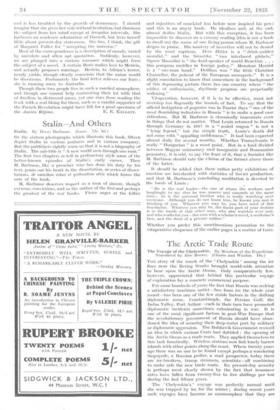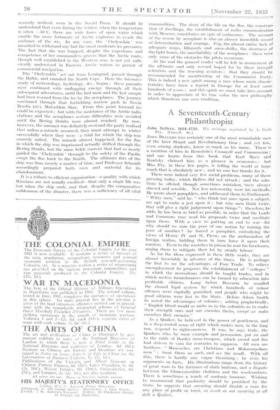The Arctic Trade Route
THE story of the wreck of the Chelyuskin ' among the ice floes near the Bering Straits brought world-wide attention to bear. upon the Arctic Ocean. Only comparatively few, however, appreciated that behind this particular voyage of exploration lay a concrete commercial purpose.
For some hundreds of years the fact that Russia was seeking a satisfactory maritime outlet—free from ice the whole year round—has been one of the few stable factors in the shifting diplomatic scene. Constantinople, the Persian Gulf, the Indus Valley, Port Arthur--each in their turn have promoted diplomatic incidents sometimes culminating in war. It is one of the most significant factors in post-War Europe that the revolutionary government of Russia should have aban- doned the idea of securing their deep-water port by military or diplomatic aggression. The Bolshevik Government revived an idea in which various Czars had dabbled : the opening of the Aretie'Oeetto as a trade route. They applied themselves to this task fanatically. Wireless stations now link lonely barren islands with other points along the coast. Where twenty years ago there was no one to be found except perhaps a wandering Sarnoyede, a Russian pedlar,, a .mad prospector, today there are ice-breakers, tramp steamers, scientists—all combining to make safe the new trade route. Its present-day security is perhaps most clearly shown by the fact that insurance rates have fallen frona twenty-five to five shillings per ton during the last fifteen years.
The Chelyuskin's ' voyage was perfectly normal until she was trapped by ice for the winter ; during recent years Such voyages have become so commonplace that they are
scarcely noticed, even in the Soviet Press. It should be understood that even during the winter, when the temperature is often — 50'C. there are wide lanes of open water which enable the more fortunate of Arctic explorers to evade the embrace of the ice. In any case, the Chelyuskin ' was unsuited to withstand any but the most moderate ice pressures. The fact that she was trapped, despite the experience and competence of her commander; proves that the Arctic route, though well established in the 1Vvst'ern seas, is not yet suffi- ciently understood in Eastern Arctic waters to permit of conimereial navigation. •
The Chelyuskin ' set. out from Leningrad, passed through the Baltic, and rounded. the North Cape. Here the intensive study of meteorology, hydrology. &c., began ; these pursuits were continued with unflagging energy through all their subsequent adventures, until the last man and the last sample had been rescued from the ice by the aeroplanes. The journey continued through that forbidding narrow gash in Novia Zemlia (ite), Matochkin Shar. From this point forward ice could be expected ; but with the assistance of the Arctic radio stations and the aeroplanes serious difficulties were avoided until the Bering Straits were &Moist reached. By now, however, the summer was definitely over and the party realised bat unless a Miracle occurred, they must attempt to Winter successfully where they were ---a trial for which the Ship was scarcely suited. The miracle almost happened, for the floe in which the ship was imprisoned actually drifted through the Bering Straits, but the same fickle current that had so nearly guided the " Chelyuskin ' ,through to the safety of the Pacific swept the floe back to the North. The ultimate fate of the ship was thus merely a matter of time, and Professor Schmidt accordingly prepared both men and material for its abandonment.
It is a tribute to efficient. organisation—a quality with which Russians are not usually credited—that only a single life was loSt when the ship sank, and that, despite the comparative suddenness of the disaster, there was a sufficiency of all vital commodities. The story of the life on the floe, the construc- tion of dwellings, the establishment of radio communication with Moscow, constitutes an epic of endurance. The account of the rescue by aeroplane is also an almost incredible record of determination and courage. Fog, the almost entire lack of adequate maps, blizzards and snow-drifts, the shortness of daylight hours, the unreliability of the aeroplanes—these were only. some of the obstacles the pilots overcame.
At the end the general reader will be left in amazement at the ultimate .and only reward hoped for by these intrepid scientists and the rescuing aviators : that they should be recommended for Membership of the Communist Party. This is indeed a new spirit among a race whose main charac- teristics have been a legend in Europe for at least some hundreds of years ; and this spirit we must take into account, in order to appreciate at its true value the new philosophy' which threatens our own tradition.































































































 Previous page
Previous page